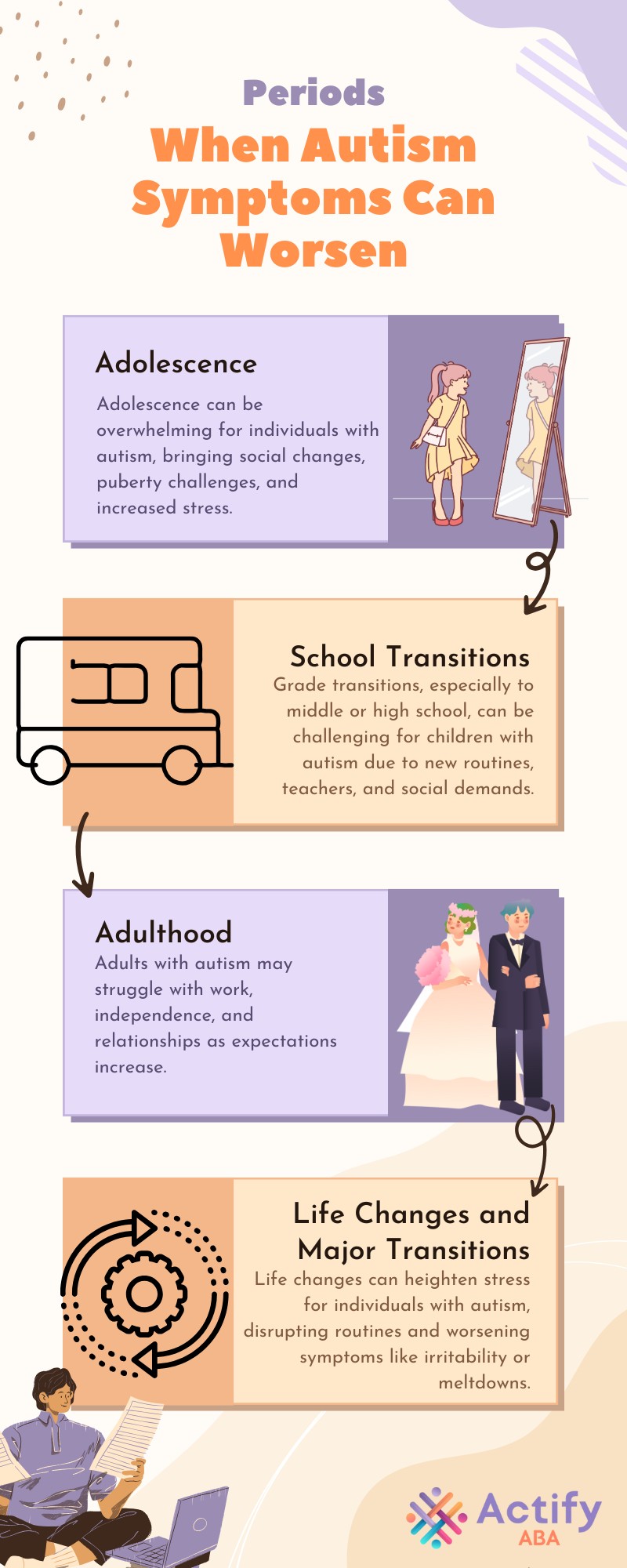
Key Points:
- Autism does not necessarily worsen with age, but the way symptoms manifest can change as individuals grow.
- Some symptoms may appear to intensify during life transitions, particularly during periods of increased social demands, like adolescence.
- Early interventions, like ABA therapy, can significantly improve outcomes and may reduce the severity of challenging behaviors over time.
When a child is diagnosed with Autism Spectrum Disorder (ASD), many parents wonder if it will get worse with age. It’s a common concern, and the answer isn’t straightforward. Autism itself is not a progressive condition in the way some neurological disorders are, but the way symptoms manifest can change as a child grows.
As children with autism age, they may experience periods where behaviors seem to intensify or new challenges emerge. For instance, research indicates that kids aged 6 to 11 can experience an increase in the severity of autism symptoms. Understanding these changes and what to expect can help parents better navigate the journey of autism.
In this article, we will explore whether autism symptoms get worse with age and what factors might contribute to changes in behavior and functioning. Additionally, we will discuss how early intervention and appropriate therapies can help manage symptoms and improve the quality of life for individuals with autism.
Why Do Autism Symptoms Get Worse With Age?
When parents or caregivers notice that symptoms of autism appear to worsen over time, it’s often due to several contributing factors rather than the condition itself progressing. Here are some of the main reasons why autism symptoms may seem to get more intense or noticeable with age:
1. Social Demands Increase with Age
As children with autism grow, their social expectations increase, particularly as they enter school and interact with peers. Autism-related social challenges that were easier to manage in earlier childhood can become more apparent during adolescence when social interactions become more complex. The difficulty in reading social cues, maintaining conversations, and forming relationships may appear more noticeable as expectations rise.
2. Sensory Sensitivities May Become More Pronounced
Many individuals with autism experience sensory sensitivities, such as heightened reactions to lights, sounds, or textures. These sensitivities may become more intense during puberty as the brain and body undergo various changes. Adolescents and adults may find that they become overwhelmed by sensory input more easily, leading to increased anxiety or behavioral challenges.
3. The Impact of Stress and Anxiety
Autism and anxiety often go hand-in-hand, and life changes like transitioning to a new school or entering the workforce can be stressful for individuals on the spectrum. Stress and anxiety can exacerbate existing behaviors, such as difficulty with transitions, irritability, or self-stimulatory behaviors. Over time, these emotional factors can contribute to changes in how autism symptoms are experienced.
4. Lack of Support or Resources
As individuals with autism transition into adulthood, they may not have access to the same level of support they received in childhood. The lack of resources or structured support can make it harder to manage symptoms, resulting in more noticeable difficulties in social, academic, or work-related settings.
5. Difficulty Adapting to Change
With age, individuals often face major life changes—such as moving to a new city, starting a job, or adjusting to new routines—that can be more challenging for someone with autism. Difficulty adapting to these changes can trigger an increase in stress and exacerbate existing symptoms like anxiety, irritability, or resistance to new situations.

Can Autism Symptoms Improve with Age?
While some autism symptoms may appear to worsen, it’s also important to note that many individuals experience improvements in certain areas as they age. Here are some key areas where improvement can be seen with time, especially with proper support:
1. Communication Skills
Many children with autism make substantial progress in communication over time, especially with early intervention. Speech therapy, social skills training, and behavioral interventions such as ABA therapy can support language development. As children grow older, they may become more adept at expressing their needs, participating in conversations, and understanding social contexts.
2. Independent Living Skills
As individuals with autism mature, they often gain more independence in daily living tasks such as dressing, eating, and managing personal hygiene. Structured routines and consistent training in functional skills can greatly enhance an individual’s ability to navigate everyday life.
3. Coping Mechanisms
With support, individuals with autism can develop effective coping strategies to manage stress, anxiety, and sensory sensitivities. Over time, many people on the spectrum learn how to self-regulate or seek help when needed. These improvements often contribute to a decrease in disruptive behaviors or meltdowns that might have been more common in earlier years.
4. Social Interaction Skills
As individuals with autism mature, they often become better at understanding and navigating social situations. With therapy and guidance, many individuals develop stronger social skills, such as recognizing social cues, initiating and maintaining conversations, and forming friendships. This increased understanding of social norms can lead to more successful interactions in both personal and professional settings.
5. Emotional Regulation
Over time, many individuals with autism develop better emotional regulation, helping them manage feelings like frustration, anger, or sadness in more constructive ways. This often leads to a reduction in challenging behaviors, such as outbursts or withdrawal, and allows individuals to respond more appropriately to emotional triggers as they grow older.

How to Help Manage Autism Symptoms Over Time
While autism symptoms may fluctuate or become more noticeable at times, there are many strategies and therapies that can help manage these challenges. The key is early intervention and ongoing support as the individual ages.
1. Applied Behavior Analysis (ABA) Therapy
ABA therapy is one of the most effective ways to manage autism symptoms. It’s a personalized, evidence-based approach that focuses on improving communication, social skills, and behavior while reducing challenging behaviors. ABA therapy teaches adaptive skills and offers a structured environment to help individuals navigate everyday challenges.
2. Social Skills Training
Social skills training programs can help individuals with autism better understand and engage in social interactions. These programs focus on skills like reading body language, making eye contact, and starting conversations, which can become more important as social demands increase with age.
3. Sensory Integration Therapy
For individuals with sensory sensitivities, sensory integration therapy can help them process sensory input more effectively. This type of therapy uses structured activities to help individuals manage sensory overload, making it easier to navigate environments that may otherwise be overwhelming.
4. Anxiety Management Strategies
Since anxiety often goes hand-in-hand with autism, teaching anxiety management strategies such as mindfulness, relaxation techniques, or cognitive-behavioral therapy (CBT) can help individuals better cope with stressful situations. By reducing anxiety, many of the symptoms of autism may become more manageable over time.
ABA Therapy in Maryland – Supporting Children and Adults with Autism
At Actify, we specialize in providing personalized ABA therapy in Maryland for individuals of all ages with autism. Whether you’re seeking early intervention for your child or support for an adolescent or adult, our team of experts tailors ABA programs to meet each individual’s unique needs.
ABA therapy has proven to be one of the most effective interventions for autism, helping individuals improve communication, social skills, and daily living abilities. We are dedicated to helping your loved one thrive by providing the necessary tools and support for their success.
Contact us today to learn how ABA therapy in Maryland can help your child or loved one lead a more fulfilling life.
